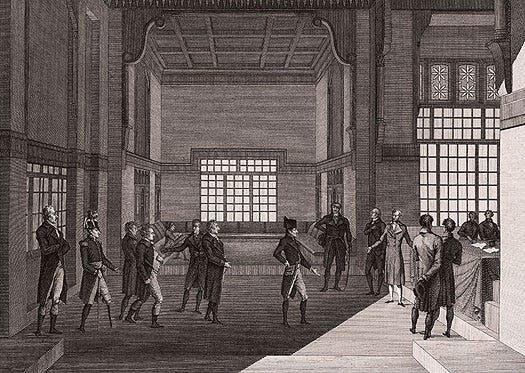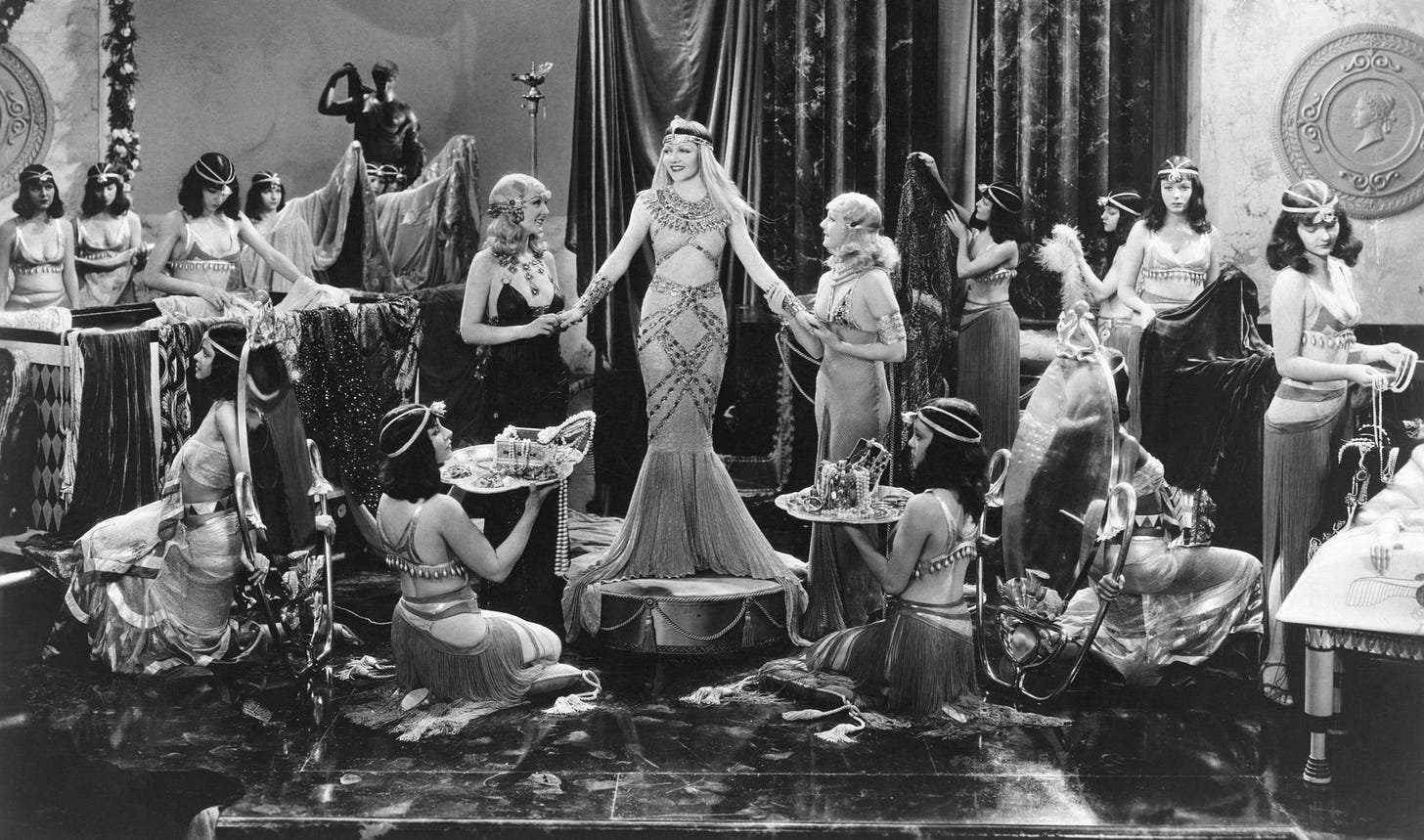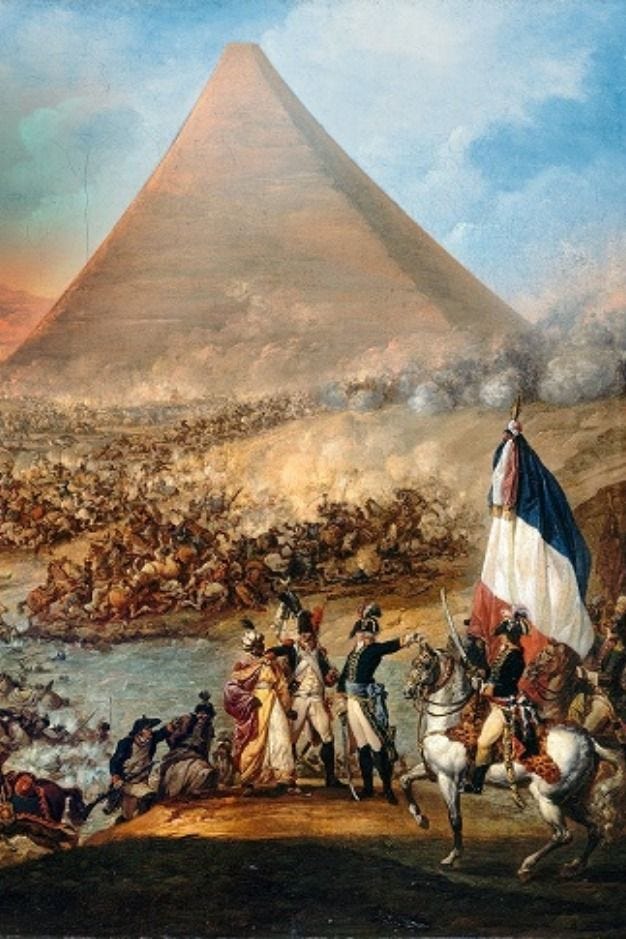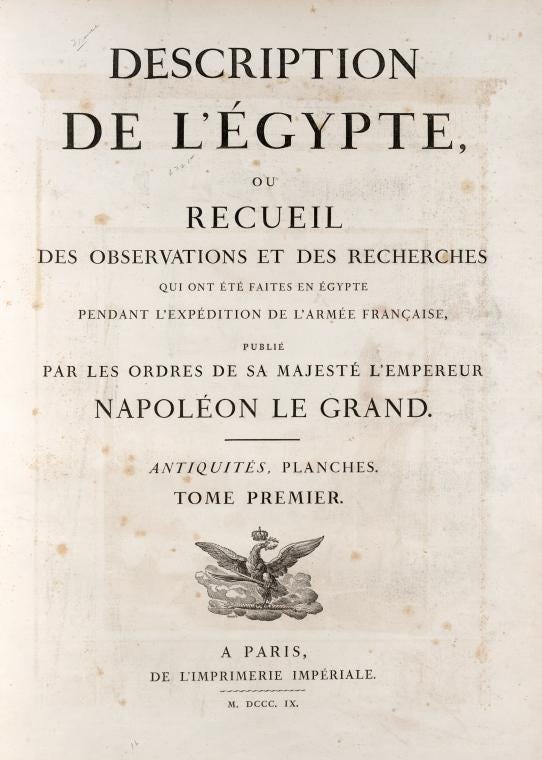As I mentioned in my last post, I’m going to be spending some time breaking down the fin de siècle boom in literature and cinema fetishizing Ancient Egyptian religion and myths (such as the evil resurrected mummy). Between the 1840s and 1930s a slew of fiction work over these tropes was produced by such authors as Agatha Christie, Bram Stoker, Sir Arthur Conan Doyle, Edgar Allen Poe, Louisa May Alcott, and HP Lovecraft; all of which were highly influential for the subsequent mummy movies made and remade many times from the 1930s -1960s, and then again in the 1990s.
In the following few newsletters I try to break down what led to this obsession as an excuse to talk about Halloween-adjacent things.
Napoleon’s Campaign in Egypt and Subsequent Surrender to the British
In the summer of 1798 Napoleon Bonaparte disembarked his ship L’Orient onto the land of Egypt with several prerogatives in mind. One, to disrupt the lines of communication between the British and their colonized counterparts in India (though this was disguised as “protecting French economic interests and returning control of Egypt to the Ottoman Empire”). Two, was naturally to expand his domain of control — likely his large ego fancied himself an Alexander the Great. And third (though I’m sure not last), to evidence his intellectual devotion and advocacy of scientific progress through study of Egyptian history and artefacts.
Napoleon had brought with him to Egypt not only soldiers but also a contingent (167) of academics and scientists who were given the name of the French savants of whom the soldiers did not look kindly upon (another common nickname given to the savants was ‘donkeys’). On August 22nd 1798 Napoleon founded the Institut d'Égypte, a scientific institute with the mission of aiding in the “progress and the propagation of the Enlightenment in Egypt”. This institute was concerned with both the ‘hard’ sciences such as math, physics, and chemistry, along with the Arts and history. In reality there was a general attitude among the educated French that Egypt was a goldmine of yet uncovered discoveries that only “a nation friendly to the fine arts” was equipped to unearth, and this was precisely what Napoleon intended to do. The group of scholars and scientists proceeded to travel throughout Egypt excavating, studying, and archiving on behalf of the institute.

Oddly enough, it was not the savants who came upon the Rosetta Stone in 1799 but rather a group of Napoleon’s soldiers. The Rosetta Stone’s origins date back to 196 B.C.E. and is inscribed with a text in three different scripts: Greek, hieroglyphs, and Demotic (another ancient Egyptian script). Successful attempts at decipherment wouldn’t happen for several decades but the challenge proved another impetus for interest in, and study of, Ancient Egypt.
In August 1799 Napoleon had secreted away from Egypt and left behind his troops to maintain control. In September of 1801 they had surrendered to the British. The British conditions of surrender meant that the savants had to relinquish all the artifacts and notes that had been amassed to the British, including the Rosetta Stone. The French scholars were understandably devastated by this and at one point even threatened to destroy all of it and themselves in a fire rather than give them up. In the end the French savants returned home nearly empty handed, and between 1809 and 1818 published a multi-volume work titled Description de l’Egypte recalling in great detail their findings in Egypt. Yet another document that brought more interest in ancient Egypt to Europe.
Returning home wealthy with the spoils of the French, the British deposited the various artefacts in the British Museum. The Egyptian pieces that had already been on display in the museum were generally unpopular at that point. But with the arrival of new materials, along with the excitement of the challenge of deciphering the Rosetta Stone, new interest from the educated elite in Western Europe formed. And so expeditions to Egypt increased, primarily to obtain more antiquities either to sell for profit or to display in national museums.
to be continued…
The Vintage Egyptologist
If you don’t already know about the FABULOUS and brilliant Dr. Colleen Darnell, please remedy that immediately. Both an accomplished egyptologist and ‘Vintage Fashion Aficionada’, she has a website, IG, several published books, and courses.








